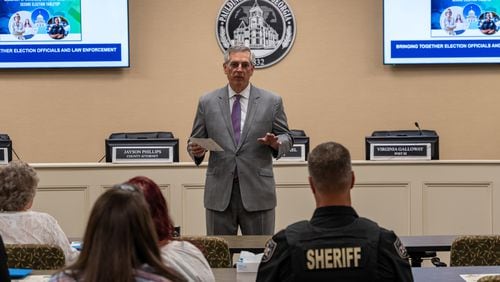In this essay, former first lady Rosalynn Carter writes on behalf of the Georgia Coalition for Equity in Education about the U.S. Justice Department's charge the state is illegally segregating students with disabilities in separate and substandard schools that isolate the children from peers.
Friday marks the year anniversary of the Justice Department's letter to Gov. Nathan Deal in which the federal agency warns:
The GNETS Centers severely restrict interactions between students with disabilities and their peers in general education, depriving them of the opportunity to benefit from the stimulation and range of interactions that occur there, including opportunities to learn, observe, and be influenced by their non-disabled peers. Even in GNETS Classrooms that are physically located in general education school buildings, many students placed in the Classrooms are unnecessarily segregated from their peers because the Classrooms are often located in separate wings or isolated parts of school buildings, some of which are locked and/or fenced off from spaces used for general education programs. Further, the State fails to ensure that admissions to the GNETS Program are limited to only those students for whom therapeutic and behavioral health services in a segregated setting may be necessary. In addition, the Department found that the vast majority of students in the GNETS Program could participate with additional aids, services, and supports in the variety and rigor of educational opportunities available in general education schools. Because of the State's administration of the Program, these students are unnecessarily segregated from their peers.
You can read the AJC investigation on this issue here.
By Rosalynn Carter
The state of Georgia needs to stop denying thousands of its schoolchildren their civil rights.
The U.S. Supreme Court's decision in Brown v. Board of Education marked a turning point in the education of our country's students. The court made clear that separate is not equal and made equal educational opportunity the law. Yet more than 60 years later, Georgia's students are still being denied these civil rights.
Credit: Maureen Downey
Credit: Maureen Downey
After a multiyear investigation, the U.S. Department of Justice found that Georgia is illegally segregating thousands of students with disabilities in a substandard statewide network of programs called GNETS (Georgia Network for Educational and Therapeutic Supports) in violation of the Americans with Disabilities Act. An entire school year has passed since the DOJ sent its letter of findings to the state, yet for the students sentenced to these programs, time has stood still and justice continues to be denied.
Friday marks the first anniversary of the DOJ letter. It is past time that Georgia found a way for these students to receive an equal education without being separated from their peers in their neighborhood schools.
These are children with mental health and behavioral health needs and who are victims of trauma. They do not attend traditional public schools. Many remain in buildings that exist as vestiges of our sad segregated history. Others attend school in locked hallways and separate mobile classrooms, where they are not permitted to interact with the non-disabled school population. Most will never attend a high school football game or school dance.
An Atlanta Journal-Constitution investigation recently found that Georgia's public schools assign a vastly disproportionate number of black students to "psychoeducational" programs, segregating them not just by disability but also by race. The newspaper found that 54 percent of students in Georgia's psychoeducational programs are African-American, compared with 37 percent in all public schools statewide.
Ultimately, as the DOJ has concluded, the educational experience is separate, unequal, and a violation of our children’s civil rights. Even the state’s own audit in 2010 found that the GNETS “cannot demonstrate that the services provided to students in the GNETS Program have resulted in improvements to [students’] behavior or academic performance.”
Decades of research show there is no benefit from segregating students with disabilities from their peers and that there are benefits from inclusion. In response to this crisis, stakeholders, including the Carter Center, have formed the In response to this crisis, stakeholders, including the Carter Center, have formed the Georgia Coalition for Equity in Education.
As a member of the coalition, I call on the state to collaborate with the Department of Justice to bring our education system into compliance with the ADA and to develop a resolution to reform the outdated GNETS program. In its place, the state should implement a broad array of supports for neighborhood schools in local school districts, where students can be successful academically and socially, graduate, and even be prepared for postsecondary education or employment.
The coalition has urged the state repeatedly but unsuccessfully to gather input from stakeholders about how to reform the system. If the state and DOJ are close to reaching a settlement, we call on them to seek stakeholder input now. Otherwise, we recommend that the DOJ take legal action to vindicate the civil rights of these students and ensure that the Brown decision’s vision of equal educational opportunities is realized for all of Georgia’s students.








